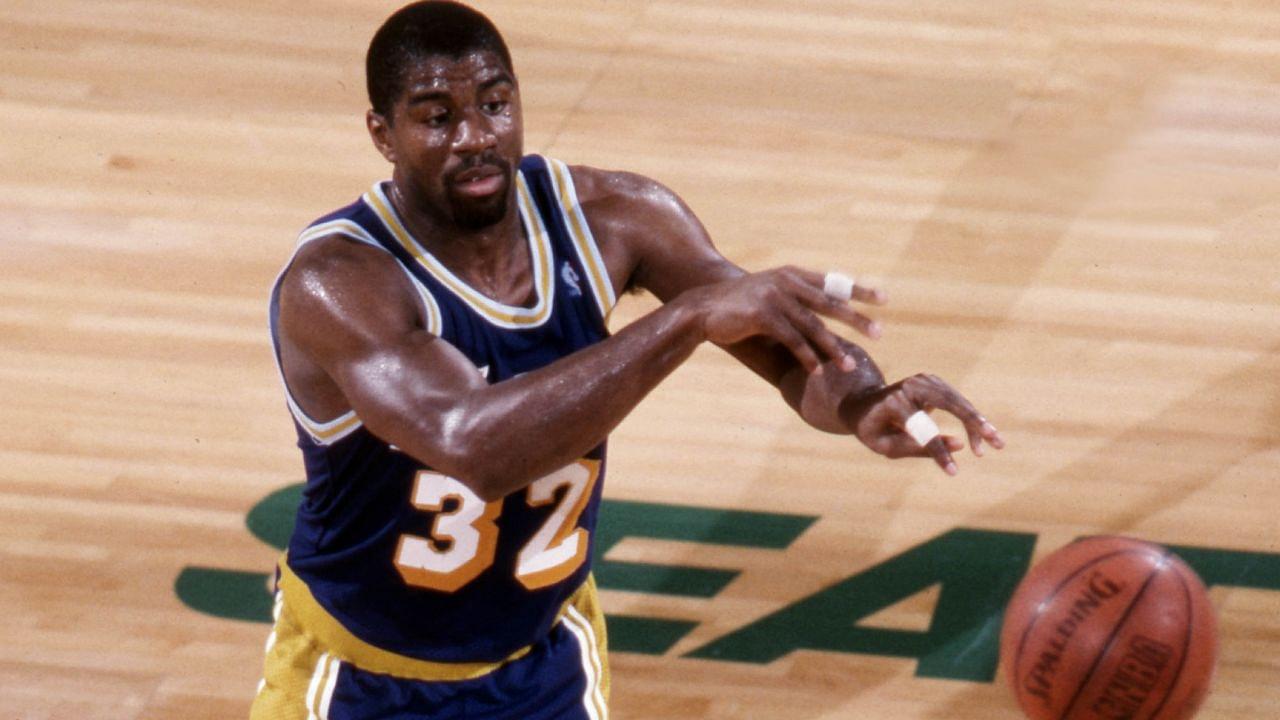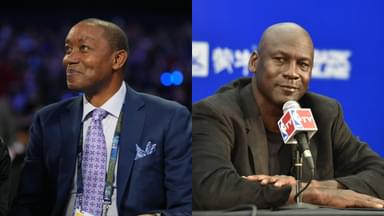Back in 1991, Magic Johnson stunned NBA fans worldwide by announcing that he had tested positive for HIV. His fight with the disease ever since has been well documented. However, for one reason or another, back in 2008, a KTLK Radio host claimed during a segment that he was confident Johnson had simply ‘faked’ having the disease, 17 years after he first announced it.
Advertisement
The Lakers legend, to his credit, came out with a brilliantly classy response, claiming that the misinformation about him hurt the cause more, than himself. According to the book, When the Game Was Ours by Magic Johnson and Larry Bird, a radio host named Langdon Perry had been convinced that Johnson had merely faked the illness.
“In October 2008, a conservative radio host of KTLK Radio in Minnesota named Langdon Perry suggested that Magic “faked AIDS.” “You think Magic faked AIDS for sympathy?” asked his cohost, Chris Baker. “I’m convinced Magic faked AIDS,” Perry answered. “Me too,” Baker chimed in. Within hours, Magic and HIV were in the news,” the book revealed.
As one would expect, this led to a plethora of media attention, and the news eventually traveled to the LA Lakers legend himself. Amidst calls of firing the radio hosts, Johnson instead had a calm response, as the book revealed he digested the news with sadness and resignation.
“It hurt our cause more than it hurt me,” Magic said. “So many people are doing such great work trying to educate young people, and then this idiot comes along. “It was irresponsible. When you say something, your audience takes it at face value,” he said, suggesting that the response led him on a familiar path, with the initial announcement in 1991 also resulting in a range of misinformation being spread about him.
“The station should have taken some action, but they didn’t, so I guess that shows you where their minds are. “If nothing else, get your facts straight. I never had AIDS. I still don’t. They couldn’t even get that right,” he said, admitting his frustration at the lack of action taken against the radio hosts. Of course, Johnson obviously had the option of taking up legal measures as well, but instead, he was content in simply making the above comments.
This non-action of his alone, speaks volumes about Magic Johnson. Despite seeing the condition he was be belittled publicly, he was only hurt about the message it sent out about HIV. It is due to that mentality that fans around the globe are more informed about the disease, and what can be done to fight it.
This was not the first time Magic Johnson felt betrayed due to his HIV diagnosis
While the above claims were made years later, Johnson had to suffer through similar intolerance when he was first diagnosed. As a matter of fact, in addition to the media, multiple NBA stars were also concerned with John’s decision to continue playing.
For example, Isiah Thomas, according to the book, came out with claims that Johnson was homosexual and commented that the diagnosis meant other heterosexual players were at risk of contracting the virus. While the two’s friendship ended following the comments, a range of NBA stars were convinced that they were also at risk of contracting HIV simply due to Johnson’s presence. This was in addition to Karl Malone, who also seemed to not understand that the virus was not communicable and the players were under no risk.
“I’m no fan, no cheerleader. It may be good for basketball, but you have to look far beyond that. You have a lot of young men who have a long life ahead of them. The Dream Team was a concept everyone loved. But now we’re back to reality,” he had said, following Johnson’s inclusion in the 1992 Olympics Dream Team. Malone had effectively suggested that Johnson needed to retire to safeguard the health of the other, younger players in the league.
Due to the reactions of players across the league, Johnson was forced to retire in 1991. While he did appear in the 1992 All-Star Game, even winning the All-Star Game MVP, it wouldn’t be until 1996 that he finally made his return to the NBA. And by then, it was a bit too late in his career to make too much of a significant impact on the history books.
That said, Magic has done a lot of good when it comes to raising awareness about HIV. In fact, if it wasn’t for him, many would likely still have some grave misconceptions about the disease, and those that may suffer from it.







